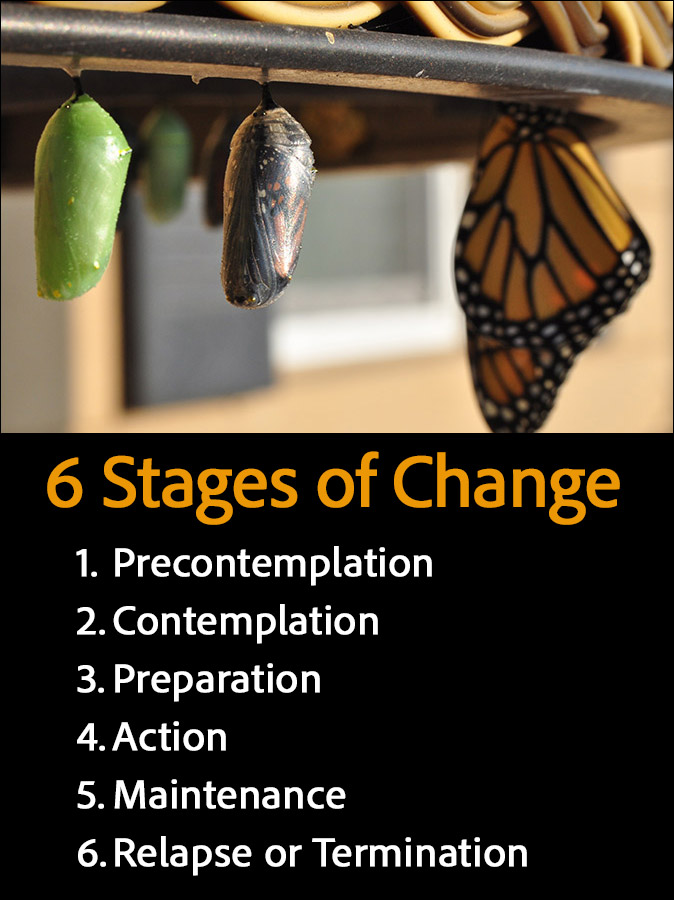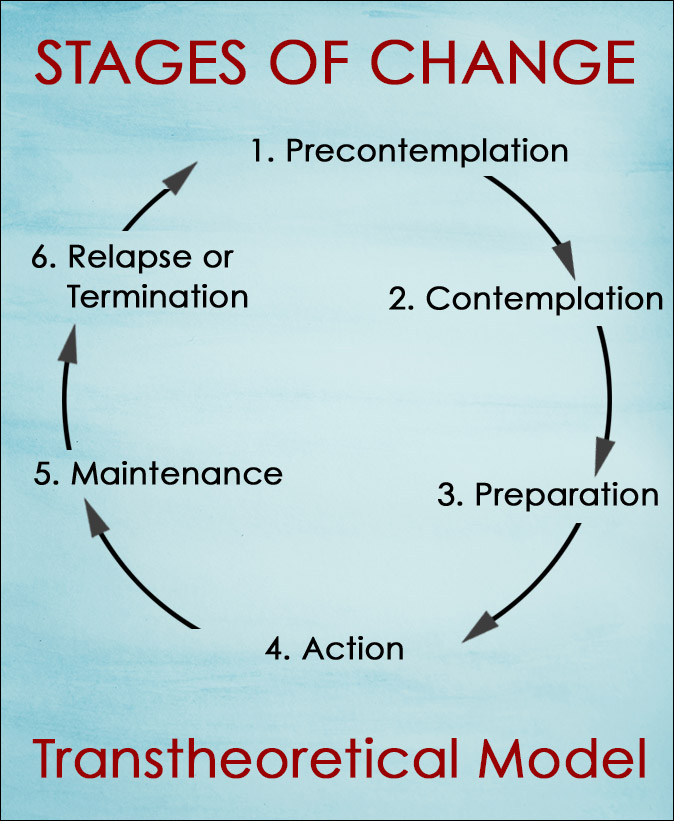
In the journey from substance use addiction to recovery, every person experiences changes in their mindset, perspective, and behavior. These are known as the Stages of Change, based on the Transtheoretical Model of Change.
The Stages of Change Model provides a broad outline of what most people can expect during addiction treatment and recovery.
The Transtheoretical Model was developed in 1977 by James O. Prochaska at the University of Rhode Island, to analyze the process of behavioral change.
Well-known in the field of addiction treatment, the stages of change model also serves as a roadmap for other types of behavioral change as well.
While it might seem somewhat academic, understanding the transtheoretical model of change and having an overview of what to expect during addiction recovery can help ease anxiety and track progress.
What is the Stages of Change Model?
The Transtheoretical Stages of Change is a model of human behavioral change over a period of time, often related to addiction, but also other behaviors such as exercise or eating disorders.
Some models are represented as 5 stages of change, although identifying six stages offers a more comprehensive approach that completes the cycle of recovery with relapse or termination.
The 6 stages of change are represented in a particular sequence, although it’s not uncommon for people in addiction recovery to jump to different stages in a different order.
- Precontemplation Stage of Change
- Contemplation Stage
- Preparation Stage
- Action Stage
- Maintenance Stage
- Relapse or Termination Stage
It’s also possible for some people be in more than one stage at a particular time.

6 Stages of Change in Addiction
1. Precontemplation Stage of Change
In the Precontemplation Stage of Change, people are generally unaware or are in complete denial that they have a substance use disorder at all.
They might even see their behavior as a positive aspect in their life because they have yet to experience any negative consequences, like losing a job, legal issues, experiencing depression, anxiety, or having trouble with relationships.
A functional alcoholic may fit in this stage because they think they have control of their drinking or don’t perceive it as a problem.
It’s difficult, if not impossible, to convince anyone in this stage that they need treatment for substance abuse or addiction.
However, as a person continues in this stage, negative consequences can be inevitable and will often usher them into next change.
2. Contemplation Stage of Change
Like the word implies, people in the Contemplation Stage of Change are more open to the idea of changing their behavior.
That doesn’t necessarily mean treatment, but they might try “cutting back” by moderating drug or alcohol use, or in some cases, even try stopping on their own.
In the contemplation stage, an individual is usually able to acknowledge some of the negative consequences, especially physical ones like hangovers, or a psychological dependence on drugs or alcohol.
Many may even have some clarity on unintended consequences, like damaging relationships.
This is only contemplation, however. It is weighted more toward the “self” in self-help, meaning people tend to think about how they can stop bad things from happening under their own power, and this stage can last for years.
Motivational Enhancement Therapy can be helpful for sparking the motivation to change behavior.
3. Preparation Stage of Change
“Something has to change,” is a likely thought for someone in the Preparation Stage of Change.
In this stage, the range of preparation can be from implementing strategies for moderating drug or alcohol use, all the way to preparations leading to treatment for addiction.
In reality, many people struggling with addiction will make numerous attempts to curb their behavior on their own. That process can last a very long time.
However, with repeated failure to change on one’s own accord, the preparation stage can motivate a person to seek help.
In more serious cases, an individual may be faced with consequences so dire they have no choice but to take whatever help or treatment is offered.
When a person does finally move into the next phase, an effective treatment facility will provide a program tailored to an individual’s particular circumstances. This improves the chances of a successful recovery.
Additional preparations may include some of the following:
- Determining the most effective approach, whether it be a 30 to 90 day stay at an inpatient residential facility or in an intensive outpatient addiction treatment program
- Creating a trusted support network of family members, counselors, and physicians to help a person successfully transition into recovery
- Diagnosing and addressing any underlying psychological drivers of addiction, such as anxiety, depression or post-traumatic stress disorder. The presence of a mental health condition and a substance use disorder together is known as a dual diagnosis. Both issues must be treated at the same time for success
- Planning for the end of treatment, which may involve continued follow-ups, staying in a sober-living facility for a time, or returning home if that is the best option for continued recovery

4. Action Stage
The Action Stage of Change can be the most stressful, especially when a person is attempting to moderate behavior on their own.
During initial addiction treatment, it can be uncomfortable if a patient needs to go through a difficult detox so their body is no longer dependent on drugs or alcohol.
Some people may avoid seeking help for this very reason, which is why it’s important to find a treatment facility that medically monitors patients during detox and can prescribe medications that make the process safer and more comfortable.
Like the other stages, the action stage can occur in small steps as a person works on their behavior and healing.
It may also end up being the life changing event they truly need by seeking professional addiction treatment.
5. Maintenance Stage
In the Maintenance Stage, a person is working to maintain the changes developed in the action stage.
For lasting recovery from addiction, this may mean avoiding old friends, going to support group meetings, having follow-ups with therapists, and working to avoid triggers that can lead to old behaviors.
This stage can be particularly challenging after a period of time. There’s no stopping life and if a person gets complacent, as is normal during the maintenance stage, it’s easy for stress, anxiety and old behaviors to work their way back into our lives.
Thorough preparation and action helps prevent this. In the preparation stage, acknowledging that stress is a key factor in addictive behavior and identifying ways to manage that is deployed during the action stage.
This entails developing new techniques for managing stress, anxiety, and triggers to avoid falling backwards into relapse.
6. Relapse or Termination Stage
The Relapse or Termination Stage is included only to acknowledge that sometimes people will fall back into old, addictive habits.
For some people, relapse is what pushes them back into the action and maintenance stages.
Relapse should never be considered a failure. In fact, people in recovery from substance use disorders have about the same relapse rates as those of other chronic diseases, like type II diabetes, asthma, and other illnesses.
When a person relapses, it sends a message that more preparation, action, and maintenance are required to get back on track.
The Stages of Change is a Behavioral Model
The Stages of Change is not a treatment method, but rather a behavioral model to help people understand the steps necessary for changing their ways.
The Transtheoretical Model was originally designed for people to quit smoking. It has since been used to illustrate all kinds of behavioral change, such as losing weight or stopping gambling.
Changing behavior can be difficult for almost anyone, especially those trying to overcome addiction.
Having an awareness of the stages of change one must pass through on the road to recovery can make it easier to attain their goals.
This behavioral change model can serve as a roadmap to know where a person is at any time during the process.
Frequently Asked Questions
Who developed the stages of change model?
The stages of change model is a major component of the Transtheoretical Model (TTM), developed by psychologists James Prochaska and Carlo DiClemente in 1977.
The term ‘transtheoretical’ refers to various psychotherapy theories regarding the process of behavioral change progressing through different stages.
Initially, it identified four stages that now includes the following six stages of change:
- Precontemplation
- Contemplation
- Preparation
- Action
- Maintenance
- Termination
The Relapse stage is often combined with the Termination stage because the cycle of recovery is either finalized or it begins again.
How does the stages of change model apply to different behaviors?
The Transtheoretical Model and Stages of Change were originally developed for the cessation of smoking and later for drug and alcohol addiction.
It has since shown to be an effective model for other forms of behavioral change, often related to healthcare, including the following:
- Disease prevention (cancer screening, condom use)
- Exercise
- Overeating and weight management
- Fall prevention
- Prescription medication compliance
What does Precontemplation mean in relation to the stages of change?
Precontemplation is the first stage of behavioral change, and it essentially means a person is not ready to change.
Reasons individuals are not ready to change can include:
- They are unaware their behavior is a problem so a change is not necessary
- Denial of having a problem
- Aware of a problem but they don’t think it is serious enough to change
- Completely resist change
What are the key differences between the precontemplation stage of change and the contemplation stage?
In the first two stages of change, there are slight differences in a person’s attitude, awareness, and recognition of problematic behavior.
In the precontemplation stage of change, a person is not ready to alter their behavior, but they become more receptive to the idea during the contemplation stage.
Precontemplation Stage
- No awareness of a problem
- Deny there is a problem
- Become defensive about the problem
- Resist or refuse to change behavior
- Consider negative aspects of making a change
- Do not want any help
Contemplation Stage
- Recognize or accept there is a problem
- Uncertain about changing behavior but do not resist it
- Explore the merits of changing behavior
- Agree to learn more information about the problem
- Consider changing behavior
- Intend to make a change within the next few months
How does the preparation stage of change set the foundation for successful recovery?
The preparation stage of change is instrumental in laying the groundwork for modifying behavior in a positive way.
During this stage, an individual will:
- Recognize the benefits and commit to making a change
- Identify goals, objectives, and establish a timeline for achieving them
- Research addiction treatment options and create a plan
- Contact therapists, treatment facilities, and support groups
All of these steps are necessary before moving to the Action stage where the real change occurs.
How long does the action stage of change typically last for most people?
The action stage of change generally lasts for 3 to 6 months for many people, although each person is different and will move at the pace that is most appropriate for their condition and circumstances.
The action stage is where the negative behavior is actually modified and the most growth occurs.
As soon as abstinence is achieved and the addictive behavior is no longer a concern, the individual will move on to the maintenance stage.
Related Posts
- 46 Movies About Drugs, Addiction and Alcoholism
Movies about drugs, addiction and alcoholism can be hard-hitting and even triggering for some people.…
- Signs Of Addiction To Watch For
Addiction is a serious disease and it is imperative for it to be regarded as…
- 8 Famous People Who Kicked Their Cocaine Addiction
People are often influenced by the rich and famous, and sadly that can mean normalizing…
